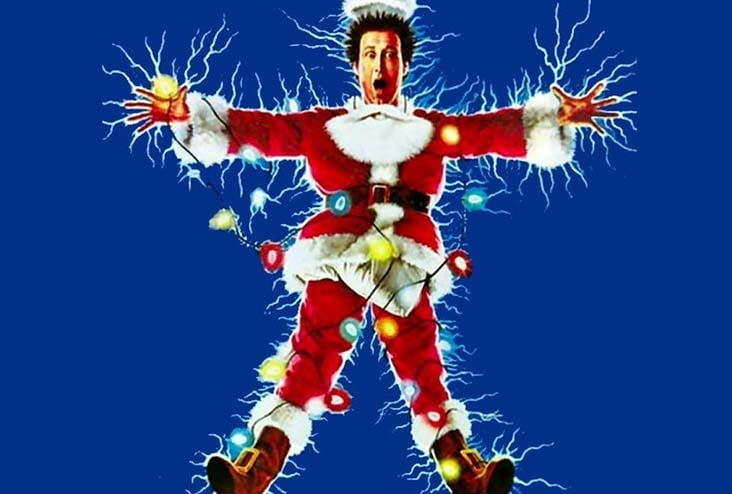The older I get, the more convinced I become that the golden age of entertainment was in the late-1980s and 1990s. Historian Rudyard Lynch of the popular YouTube channel, “WhatIfAltHist,” quite astutely calls this pre-millennium era “John Hughes and Simpsons America.” It was a different time, largely bookended by the collapse of the Soviet Union and September 11.
It was the time just before smartphones and social media. Those of us who grew up in this era were part of the last generation of kids whose freedom was marked by riding bikes and playing pickup sports for hours with little parental supervision. We had textbooks and lockers. We had time to think, talk, and create without the availability of round-the-clock screen time. And when we had the time to seek out entertainment, we tuned into our favorite television shows once a week or watched our favorite movies on VHS tapes.
Personally, I loved the John Hughes America and I go back to it as often as I can and there’s no better season for stepping back into this era than the holidays. Admittedly, I am not a movie buff. Most of my media consumption is reserved for live sports and podcasts. When it comes to movies, I am a creature of habit and tradition. Every year, I rewatch my favorites depending on the season. And from Thanksgiving to Christmas, it’s Hughes for the Holidays.
The three films that represent the cornerstones of my holiday traditions are Plains, Trains and Automobiles (1987), National Lampoon’s Christmas Vacation (1989) and Home Alone (1990). It is quite remarkable that John Hughes was able to write and produce all three of these classics in such a short period of time. Even more impressive, in the same span of time (1987-1990), he also made Uncle Buck and The Great Outdoors.
John Hughes was born in Lansing, Michigan in 1950. He spent his early years in Grosse Pointe and moved with his family to Northbrook, Illinois when he was in middle school. Hughes was a product of suburban life in middle America. His life experiences and observations were reflected in his films, which were largely based in the Chicago suburbs.
In Planes, Trains and Automobiles, Hughes offers a glimpse at the struggles of corporate life. Viewers follow character Neil Paige (Steve Martin) on his journey of follies with traveling salesman Del Griffith (John Candy). Paige’s straight-laced persona matched with Griffith’s jovial disposition make for a series of hilarious episodes on their turbulent journey back to Chicago after being stranded in an airport.
National Lampoon’s Christmas Vacation features suburban dad, Clark Griswold (Chevy Chase), who is determined to provide a meaningful Christmas season for his family. While his work in the food additive business goes unappreciated, his attempt to bring the generations together for a “fun, old-fashion family Christmas” goes awry until Clark and the family realizes that the chaos of being together is the meaning they’ve been searching for all along.
Kevin McCallister (Macaulay Culkin) is an eight-year-old boy who misses the wake-up call for his family trip to Paris and is inadvertently left behind in Home Alone. His childhood fantasy to make his family disappear comes true, but he quickly learns that being head of the house is no small task. Kevin is challenged with defending his home from burglars while his mother navigates the chaotic holiday travel to get back to her son.
One thing that remains consistent in all of John Hughes’ films is his uncanny ability to understand people at different phases in life. In Planes, Trains and Automobiles and Christmas Vacation, he portrays the lives of middle-aged men trying to balance their work and family life. While in Home Alone, Hughes places himself in the mind of a child. Other Hughes films such as Ferris Bueller’s Day Off focus on the teen years.
Throughout all of these films, John Hughes demonstrates the ability to understand the hopes, fears, and dreams of the middle-American everyman. Neil Paige learns sympathy for his traveling companion Del Griffith, who reveals he has lost his wife and now lives on the road. Clark Griswold’s plans to give his family the perfect Christmas experience turns into a series of disasters. By the end, he learns that he doesn’t have to try so hard to earn the love and respect of his family. Kevin McCallister comes to appreciate his parents and siblings and realizes he’s content with his childhood status after all.
These John Hughes films were ingrained into the pop culture of the era in which they were released. Yet, they still hold value today. My own children enjoy these movies as much as I do, despite the fact they were released 30 years before their birth. If I’m being honest, I cannot name many films released in the 1950s (30 years before I was born) that hold near the same significance to me.
John Hughes passed away in 2009 at just 59 years old. In just a 20-year span (1980-2000), Hughes wrote and produced a plethora of classic American films that not only encapsulate the era but withstand the test of time. His characters were iconic, and his films reflected life in middle America in ways that drew the sympathies of all viewers. I miss the John Hughes America, but the holiday season offers all of us a perfect opportunity to relive it.

Leave a Reply